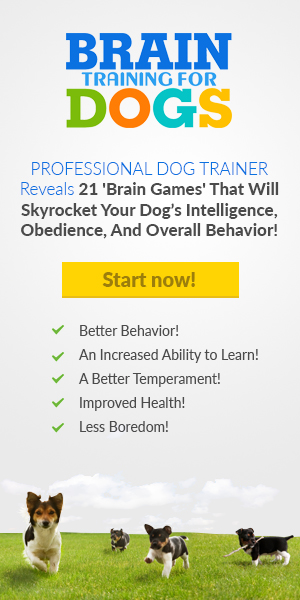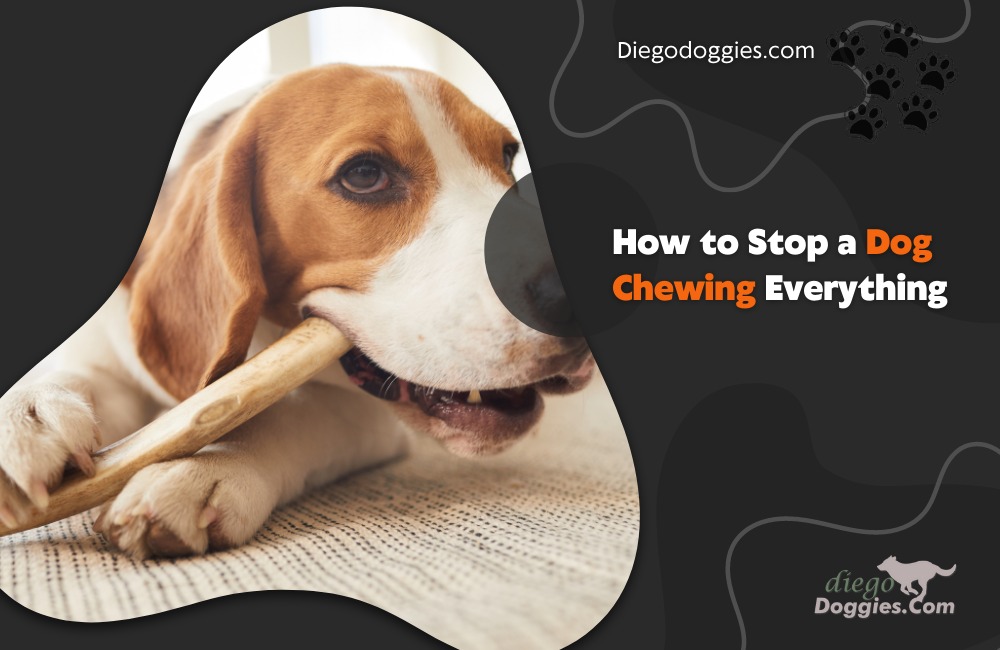It is important to understand why your dog is chewing before trying to stop the behavior. Dogs chew for many reasons including boredom, teething, hunger, and even fear.
If your dog is chewing out of boredom, try providing them with more toys and interactive playtime. If your dog is chewing due to teething, provide them with safe chew toys that will help soothe their gums.
If your dog is chewing out of hunger, make sure they are getting enough food and try adding some chewable treats to their diet. Lastly, if your dog is chewing out of fear, provide them with a safe space where they feel comfortable and cannot access anything they could potentially damage.
Why Do You Need To Understand The Root Of The Problem Before Starting Modification Training?
If you do not understand the root of the problem, you may not be able to properly address the chewing behavior. For example, if your dog is chewing out of boredom, simply providing them with more toys may not be enough. You will need to find ways to keep their mind occupied and engaged, such as interactive playtime or training exercises.
If your dog is chewing out of fear, you will need to help them feel more comfortable and secure in their environment before you can begin working on the chewing behavior. Understanding the root of the problem will help you create a more targeted and effective training plan.
How To Develop A Training Plan To Stop A Dog From Chewing?
The first step is to identify the trigger for the chewing behavior. Is it boredom, fear, hunger, or something else? Once you know the trigger, you can begin to develop a training plan.
If the trigger is boredom, you will need to find ways to keep your dog’s mind occupied and engaged. This could include interactive playtime, training exercises, and/or providing more toys.
If the trigger is fear, you will need to help your dog feel more comfortable and secure in their environment. This could include crate training, positive reinforcement training, and/or making sure they have a safe space to retreat to when feeling scared or overwhelmed.
Once you know the trigger for the behavior, you can begin to develop a training plan that will address the root of the problem.
What Are Some Consequences Of Not Addressing A Dog’s Chewing Behavior?
If a dog’s chewing behavior is not addressed, it can lead to some serious consequences. Dogs that chew excessively can damage furniture, clothing, and other belongings. They can also injure themselves if they chew on something sharp or poisonous.
Excessive chewing can also lead to behavioral problems such as separation anxiety or aggression. If you suspect your dog is chewing excessively, it is important to consult with a professional trainer or behaviorist to develop a training plan that will address the root of the problem. Ignoring the problem can lead to serious consequences for both you and your dog.
Dog-proofing Your Home
If you have a dog that loves to chew on everything, it is important to Dog-proof your home. Some tips to Dog-proof your home are:
- Keep all food and trash securely out of reach.
- Put away any items that you do not want your dog to chew on.
- Provide your dog with plenty of chew toys that are safe and durable.
- Keep your Dog’s nails trimmed to prevent damage to your belongings.
- Supervise your Dog when they are inside and provide them with a comfortable place to rest and relax.
By taking some simple precautions, you can help prevent your Dog from damaging your belongings and keep them safe.
Training Your Dog Not To Chew
There are a few different techniques you can use to train your Dog not to chew.
- If your dog is chewing on something they should not, give them a firm “no” and provide them with a toy or chew treat.
- Avoid using physical punishment, as this can make the problem worse.
- Use positive reinforcement also called force-free training methods to train your dog.
- Be consistent with your commands and rewards, so your Dog knows what they are supposed to do.
- Be patient, as it may take some time for your Dog to learn what is expected of them.
With patience and consistency, you can train your Dog not to chew on things they should not.
When To Seek Professional Help
If you have tried everything and your Dog is still chewing excessively, it may be time to seek professional help. A certified dog trainer or behaviorist can help you develop a training plan that is specific to your Dog’s needs.
They can also offer guidance and support as you work to address the root of the problem. You can also take online training courses to learn dog behavior modification techniques.
Frequently Asked Questions And Answers People Ask When Trying To Stop Their Dogs From Chewing
They can also injure themselves if they chew on something sharp or poisonous. Excessive chewing can also lead to behavioral problems such as separation anxiety or aggression. If you suspect your dog is chewing excessively, it is important to consult with a professional trainer or behaviorist to develop a training plan that will address the root of the problem. Ignoring the problem can lead to serious consequences for both you and your dog.
- Keep all food and trash securely out of reach. - Put away any items that you do not want your dog to chew on. - Provide your dog with plenty of chew toys that are safe and durable. - Keep your Dog's nails trimmed to prevent damage to your belongings. - Supervise your Dog when they are inside and provide them with a comfortable place to rest and relax.
By taking some simple precautions, you can help prevent your Dog from damaging your belongings and keep them safe.
- If your Dog is chewing on something they should not, give them a firm "no" and provide them with a toy or chew treat.
- Avoid using physical punishment, as this can make the problem worse.
- Be consistent with your commands and rewards, so your Dog knows what they are supposed to do.
- Be patient, as it may take some time for your Dog to learn what is expected of them.
You can also give your Dog a frozen wet cloth or ice cube to chew on. If you Dog is still having trouble, it is important to consult with a veterinarian to rule out any other potential health problems.
If your Dog is still having trouble, it is important to consult with a professional trainer or behaviorist to develop a training plan.
It is important to be consistent with your commands and rewards so that your Dog knows what is expected of them. With patience and consistency, you can train your Dog not to chew on things they should not.
Conclusion
If your Dog is chewing excessively, there are a few things you can do to help address the problem. Chew toys and bones can help redirect their chewing behavior and keeping them well-exercised can help prevent boredom or excessive energy.
If your dog is still having trouble, it is important to consult with a professional trainer or behaviorist to develop a training plan. If you cannot afford a professional trainer or behaviorist, we recommend the training program shown below.
With patience and consistency, you can help your dog learn what is expected of them and stop chewing on things they should not.
Related Contents
- 14 Easy Ways to Exercise Your Dog: Fun and Effective Methods
- 8 Therapy Dog Training Tips: How to Train Your Dog
- How Much Does Dog Training Cost? A Comprehensive Guide
- How to Make Crate Training Easy for Your Puppy
- How to Stop a Puppy from Biting You
- How to Teach a Dog to Smile: Fun and Easy Tips
- How to Train a Big Dog: Tips for Effective Obedience Training
- How to Train Your Dog to Roll Over in 7 Easy Steps
- Important Essential Training Tools for Dogs
- San Diego Dog Park Safety Tips, Training, and Dog Accessories
- Seven Top Tips: How to Train Your Dog to Hunt
Act Now – Click On The Graphic Below!
By using positive reinforcement also known as force-free training methods, you can stop a dog from chewing and help your dog learn and improve their behavior overall.

Disclosure: We disclose that we are affiliates of www.braintraining4dogs.com because we believe in
the approach of force-free or positive reinforcement training methods.


1 thought on “How to Stop a Dog Chewing Everything”